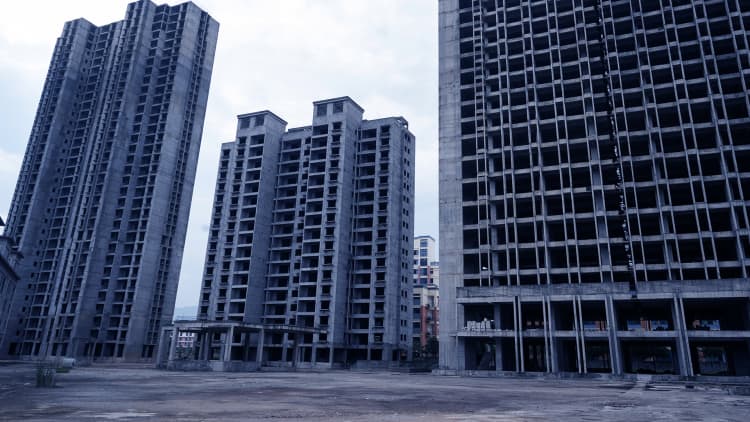
On May 17, 2024, a real estate construction site in Wanxiang City, Huai’an City, Jiangsu Province.
Future Publishing | Future Publishing | Getty Images
BEIJING – China stepped up its support for real estate across the board on Friday, but it will take some time to show results, analysts said.
Despite the news, S&P remains firm on its fundamentals On Monday, Edward Chan, the company’s director of corporate ratings, said in the company’s webinar that China’s real estate market may still be “finding the bottom” from the beginning of this month.
“The significance of the policies launched last Friday is that the government is launching all these policies at once on the same day and at the same time,” he said. “This shows that the government is serious and focused in stabilizing the real estate industry.”
But he noted that for real estate to see significant stabilization, homebuyer demand and confidence would need to improve after nearly three years of market downturn.
Hong Kong-listed property stocks surged late last week but were little changed on Monday, according to financial database Wind Information’s industry index.

Chinese authorities on Friday lowered the minimum down payment ratio to 15% from the previous 20%, while removing the national mortgage rate floor.
Policymakers also sought to increase liquidity for developers, providing 300 billion yuan ($42.25 billion) in financing to local state-owned enterprises to buy unsold completed apartments and convert them into affordable housing.
We believe Beijing is moving in the right direction in ending this epic housing crisis.
Ting Lu
Chief China Economist, Nomura Securities
“While some of these measures are unprecedented (for example, the minimum down payment requirement has never been lower than 20% before), they are consistent with our real estate team’s estimate that at least 1 trillion yuan in funding will be needed to begin to absorb excess inventory and allow new home prices to increase. However, these measures are still not enough.
“We believe Beijing is moving in the right direction in ending this epic housing crisis,” Lu Ting, chief China economist at Nomura Securities, said in a note on Monday.
“Beijing has shifted from building public housing to ensuring the delivery of large numbers of pre-sale units to rebuild homebuyer confidence, marking an important step towards cleaning up a huge mess.”
“However, this is proving to be a difficult task and we believe the market will need to be more patient as it awaits more stringent measures,” he said.
Official data released on Friday showed real estate investment fell more sharply in April than in March, with more commercial floor space sold in the first four months of the year. down 20.2% Started a year ago. Data also showed retail sales growth was lower than expected in April.
Most household wealth is in real estate, and uncertainty about future income is also weighing on consumer spending.
Rebuilding homebuyer confidence
S&P’s Chen said homebuyers’ confidence depends in part on their economic prospects and whether they will be able to take delivery of the apartments they have paid for but not yet received.
Apartments in China are often sold before construction begins.But in recent years, financing difficulties and other problems for real estate developers have led to longer delivery times — and some developers The buyer has been waiting for years.

“If house prices are stable, I think more homebuyers will be willing to enter the market,” Chen said. He noted that since buying an apartment is a major investment for most people, they “don’t want to see their capital shrink. ”.
An official 70-city house price index released on Friday, which looks at a seasonally adjusted annualized weighted average, fell faster in April than in March, Goldman Sachs analysis showed.
Nomura’s Lu estimates that China’s housing prices will fall by an average of 25% to 30% in 2020 and 2021 from the historical highs in 2020 and 2021.
He also estimated that there are still about 20 million pre-sale apartments yet to be completed, with a funding gap of about 3 trillion yuan ($414.58 billion).
Lu predicts that Beijing may conduct a nationwide survey of residential projects in the coming months to estimate how much money will be needed to complete the construction and delivery of housing.
“We believe that rebuilding home buyers’ confidence in the pre-sale system is a prerequisite for a real recovery in China’s real estate market,” he said.





